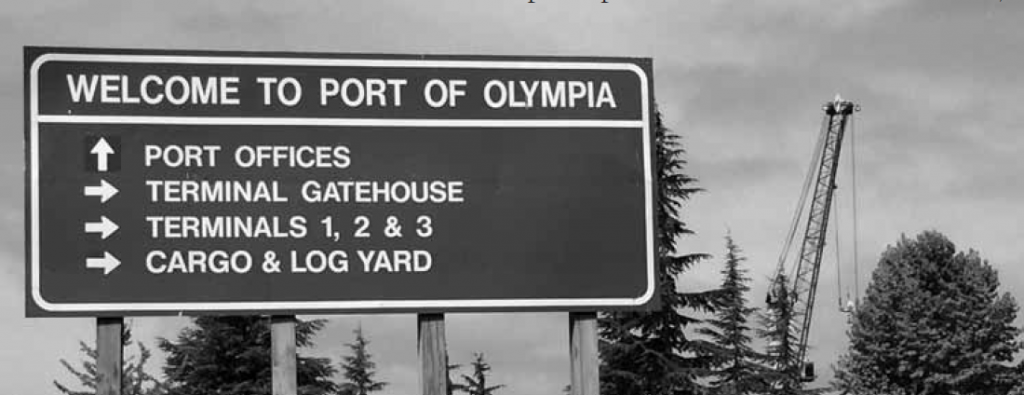The political reality in which we reside is government of, for and by special interests. Today, the essence of government is that of a support system for a corporate welfare capitalism. At the federal level in Washington DC, we see that corporate lobbyists have become the regulators of their client industries. Below, at the Port of Olympia, the majority of port commissioners serve as handmaidens to special interests such as log exporters and boaters.

In the scheme of things, the Port of Olympia is but a drop in the bucket. Yet, it presents a microcosm of the larger political reality, and therefore has a value in being examined under a microscope.
A port in Washington is an intersection of commercial and governmental functions, a hybrid of commercial venture and public agency. But first and foremost, it is a public agency which carries a fiduciary duty beyond its commercial role.
The people are sovereign
In our state the conduct of public officials and agencies is governed in large part by Title 42 of the Revised Code of Washington. Public officials such as port commissioners have a primary fiduciary duty to the public interest. In this regard, RCW 42.56.030 asserts the following:
- The people retain sovereignty over the agencies that serve them.
- The people do not cede the right to know what is good for them and must maintain control over the agencies that serve them.
- This provision shall be liberally construed to promote the public policy and to ensure that the public interest is fully protected [Emphasis added].
The theory of governance under state law is that the people are the sovereign interest. However, institutional interests within port agencies as well as their trade association have attempted to warp this clear duty. In its place, these port interests have insidiously striven to put the institutional entity in a place of primacy over the public interest.
Replacing the sovereignty of the people with supremacy of the port
Over the past decade, Thomas H. Tanaka, an attorney with the port of Seattle, has traveled far and wide to preach a doctrine that asserts the supremacy of the port entity.
In 2015 Tanaka made his presentation in Olympia at a Port Commission Work Session. Until recently, the port carried his presentation on its website. I attended his presentation to the commission and was appalled by his attempt to undermine the sovereignty of the people.
Much of Tanaka’s presentation made common sense, e.g. the commission should govern and not try to manage operational details. However, when it came to a commissioner’s duty of loyalty, he asserted: “Your paramount duty is to serve the entity —the port—on which you serve.” [Emphasis added] Effectively, he threw out the sovereignty of the people and replaced it with the sovereignty of the institution.
Bad things can happen when the public interest is abandoned
When the institution’s interest becomes paramount, bad things can, and will happen. One need only look at the governance of the Catholic Church to see the horrors that can flow from this. The governing body of bishops decided that their paramount duty was to protect the institution by covering up the widespread sexual abuse of children. Here, the interest of the institutional entity trumped its moral code, with the young victims being cast off as acceptable collateral damage.
When a port commission holds the port entity above the public interest, it opens itself up for abusive practices. (I want to be clear that I am not drawing a moral equivalency between child abuse in the church and port financial actions.) Nevertheless, governmental abuse can come in the form of excessive tax levies that siphon public dollars from the tax base, taking them away from legitimate social needs and redirecting them to the benefit of commercial interests.
Affirming loyalty to the special interest
The majority on our port commission has taken a step even beyond institutional primacy by conflating narrow special interests with the public interest. This conflation was evident at a commission meeting earlier this year. During the public comment period, an advocate for log exports addressed the commission and asserted that their oaths of public office made them duty bound to swear unquestioned loyalty to the marine terminal. In essence, he demanded a loyalty oath from the commissioners to his special interest and the main business of the terminal (i.e. log exports). In response, Commissioners Downing and McGregor kowtowed and slavishly swore obeisance. Only Commissioner E.J. Zita stood up for the public interest by declaring that a commissioner had a primary fiduciary duty to the public interest and not a special interest. Given the composition of the commission, she is a voice crying in the wilderness of indifference to the common good.
So, if the port commission has a distorted view of proper governance, how does it manifest it in commission actions?
Warped governance produces bad investment decisions
Voltaire posited that when the absurd is accepted, the atrocious will follow. In this regard, just think of the absurd election of Trump and the atrocious governance that has ensued. So too, when our port commission majority absurdly bows to special interests, it becomes likely that atrocious practices will follow.
One of the key functions of the port commission is the approval of capital investments. There are some types of capital investments primarily aimed for public use and benefit. For this type of investment, there should be no expectation for a financial return. However, in its hybrid role when the port invests in commercial projects, there must be an expectation that the nature of the investment should be symbiotic (mutually beneficial) and not parasitic (private benefit at public expense).
With a distorted theory of governance, critical thought and analysis give way to a fundamentalist and uncritical mindset making possible port investments ranging from the bad (e.g.log loaders) to the absurdly bad (e.g. mobile crane).
Ever-increasing taxes to pay for parasitic commercial investments
A biblical passage holds that by their fruits shall you know them. In this regard, it is insightful to examine the port’s last five major capital investments which totaled over $27 million in public funds. These investments are: the mobile harbor crane; the marine terminal stormwater system; the marina fuel dock; the Lacey commercial building; and the new log loaders. Every one of these commercial investments has failed to support itself and requires a significant subsidy from the ever-increasing tax levy. I contend that these investments are parasitic in nature rather than symbiotic.
A free hand to levy additional taxes
So the question arises: What is the effect of these boondoggles on our county’s tax base? According to the Thurston County tax assessor, the tax levy for the port district has increased by 27% since 2016, compared to less than 13% for other districts. The current tax levy is $6.5 million and the port commission has the power to double it without a vote of the people.
In its public relations campaign of Vision 2050, the port put out a very misleading propaganda piece entitled “Returning Your Investment.” If one only read that piece, you would think that the port is producing outstanding results for tax payers.
Dressing up a poor performance
However, this document presents a grossly false narrative. It brags that the Port of Olympia is one of the leading ports in operational results. In actuality, of the 15 largest Washington ports, Olympia is the worst in operational results. Moreover, it requires a tax subsidy of $.55 for every dollar of operational revenue. “This subsidy is three times the average for the other ports.” I do not think that these results warrant bragging.
Reclaim sovereignty in November’s port election
As the 2016 presidential election showed, elections do have consequences. Good governance requires dealing with empirical realities, and not by engaging in magical thinking. Just as Trump’s “Make America Great Again” is a mindless notion, so too is the port’s often touted claim of being the “Economic Engine of Thurston County.” So long as the commission majority of Downing and McGregor continues, the reign of magical thinking will remain and taxes will be wasted. Commissioner Zita has brought a critically analytic mindset to port deliberations. But she is powerless in the face of the fundamentalist majority. If she is joined on the commission by Helen Wheatley, there will be a swing to governance by critical reason.
The problems at the port are deep and cannot be suddenly changed in the short run. But a change in direction is sorely needed.
Denis Langhans is a retired corporate executive who holds a PhD in the humanities. He has been observing governance patterns at the port for several years.

Be First to Comment